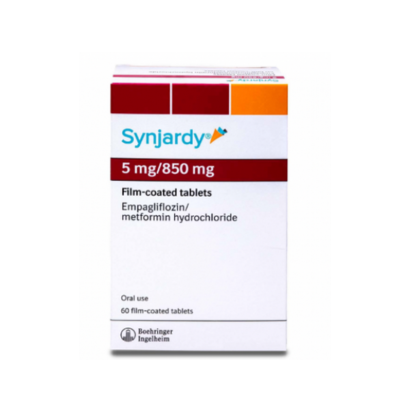Synjardy
- Requires Prior Diagnosis By GP for Approval
- Dual Mechanism for Blood Sugar Control
- Weight Management Support
- Cardiovascular Protection
- Convenient Oral Tablet
- UK Regulated Pharmacy
Synjardy
Category:TabletsSynjardy is a prescription medication used to treat type 2 diabetes. It is a combination of two active ingredients: empagliflozin (a sodium-glucose co-transporter 2 inhibitor) and metformin (a biguanide).
Fetching Data...
Frequently Asked Questions for Synjardy
How Synjardy Works: Synjardy works through two distinct mechanisms to help manage blood sugar levels:
- Empagliflozin: Blocks the reabsorption of glucose in the kidneys, leading to increased glucose excretion in the urine and lower blood sugar levels.
- Metformin: Reduces glucose production by the liver and improves the body's sensitivity to insulin.
Usage and Benefits: Synjardy is typically taken orally, usually once or twice a day, with meals. Benefits of Synjardy include:
- Blood Sugar Control: The combination of empagliflozin and metformin helps lower blood sugar levels, particularly after meals.
- Weight Management: Empagliflozin may lead to weight loss due to its mechanism of increasing glucose excretion.
Side Effects: Common side effects of Synjardy may include:
- Urinary tract infections
- Yeast infections
- Increased urination
- Nausea or upset stomach
- Diarrhea
Serious side effects are rare but can include lactic acidosis (with metformin use) and dehydration (due to increased urination).
Contraindications: Synjardy may not be suitable for everyone. Contraindications include:
- Severe kidney impairment
- History of hypersensitivity to empagliflozin or metformin
- Metabolic acidosis
- Dehydration
Signs and Symptoms: If you experience any of the following signs or symptoms while using Synjardy, seek medical attention:
- Severe nausea, vomiting, or diarrhea
- Rapid or shallow breathing
- Weakness, tiredness, or muscle pain
